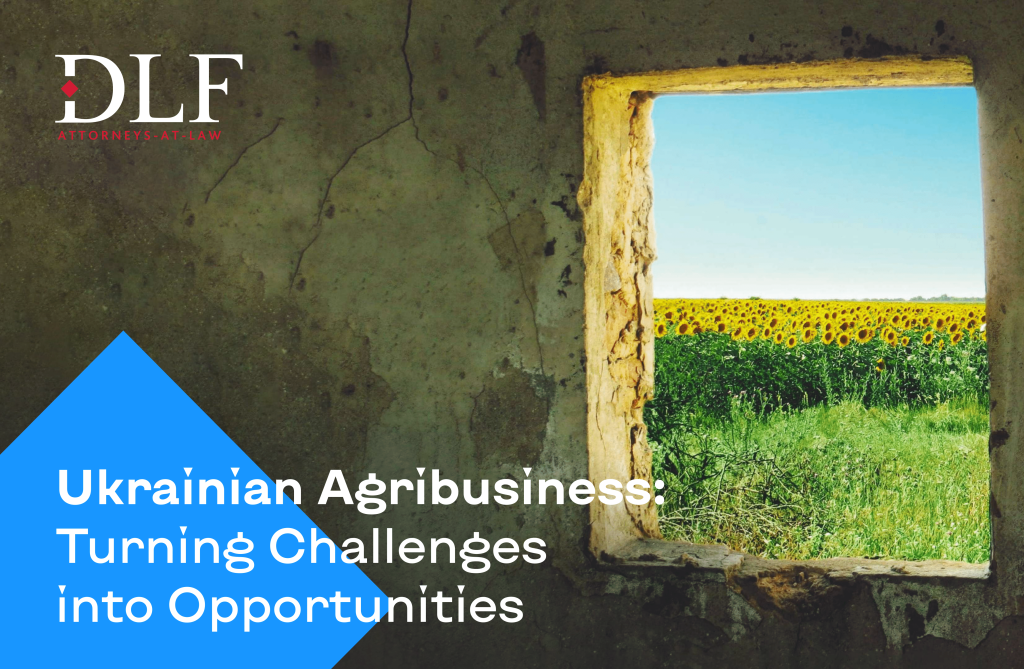Ukrainian agriculture: turning challenges into opportunities (webinar)
On 27 February 2024, Iurii Dynys, Head of Agribusiness practice at DLF attorneys-at-law Ukraine, held a webinar on “Ukrainian agriculture: turning challenges into opportunities” with the support of the Food and Agriculture Committee of the German-Ukrainian Chamber of Commerce and Industry.
The webinar was dedicated to the unique situation that could potentially create massive opportunities for foreign and Ukrainian businesses, despite the challenges of a full-scale war.
Iurii noted that in order to use such opportunities it was necessary to:
- soberly assess the risks associated with the war, and avoid being simply intimidated by them;
- understand the opportunities arising from the risks;
- be aware of the tools available to implement these opportunities;
- understand the risk mitigating tools.
Related pubication: Ukrainian agribusiness: turning challenges into opportunities
Key factors related to the war in Ukraine that have a significant impact on the Ukrainian agricultural sector include:
- limited access to cultivated areas;
- damage to production facilities, equipment, and infrastructure;
- limited access to mineral fertilisers, plant protection products and fuel due to logistical problems and price increases;
- contamination of crop areas by unexploded ordnance, mines and shrapnel, and other challenges facing the Ukrainian agricultural sector.
On the other hand, the impact of these risk factors on agribusiness should be assessed thoroughly. In particular, the following should be taken into account:
- only 20% of Ukraine’s territory is occupied, and the rest of the country is fully functional; all government agencies, courts, and state registries continue to operate as usual, and business activity is on the rise;
- only the frontline area and those bordering Russia suffer from constant shelling;
- for more than 2 years of war, a large number of agro-processing enterprises have been relocated from the occupied and dangerous territories and have successfully continued their operations in other regions;
- large infrastructure projects are being successfully implemented;
- the hryvnia exchange rate is within acceptable fluctuations, and the NBU’s foreign exchange reserves are currently higher than pre-war levels;
- Ukrainian small and medium-sized agricultural enterprises have access to financing through government and international support programmes. These funds are used to restore, repair, and create new production facilities, as well as to purchase necessary inputs and services;
- the 2023 sowing campaign took place in all territories that are not occupied and are not under active hostilities.
Iurii emphasised that the current situation was unique for agribusiness in Ukraine due to a combination of factors, including:
- high demand for goods and services necessary for the functioning and recovery of Ukraine’s agricultural sector in times of war;
- large-scale opportunities for investment in the reconstruction of key infrastructure objects and the construction of new ones;
- new opportunities for small and medium-sized investors and contractors;
- international financial assistance and investments for the recovery of Ukraine’s agricultural sector.
Iurii also provided a practical overview of the methods and solutions to mitigate potential political risks that may affect investments in Ukraine.
A separate part of the webinar was devoted to practical ways for foreign businesses to take advantage of the opportunities offered by the Ukrainian agricultural sector. Iurii discussed with the audience the acquisition and creation of agribusinesses in Ukraine, implementation of investment projects with significant investments, creation of industrial parks, as well as participation in public procurement.








